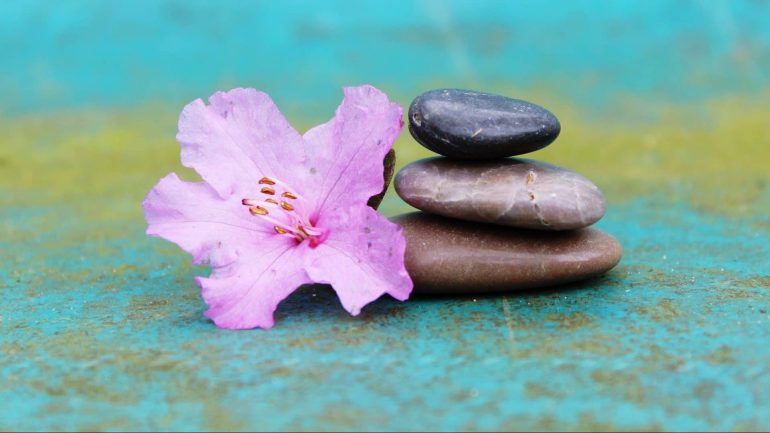How You Can Use Meditation for Insomnia to Beat It for Good
written by / December 2, 2019

If you struggle to fall asleep, chances are you have insomnia. Insomnia, defined as difficulty falling or remaining asleep, is a growing condition affecting the young and old alike. This condition eventually results in extremely short or low-quality sleep, which impairs normal functioning and everyday life.
According to experts from all around the world, using meditation for insomnia is one of the best natural remedies to relieve the condition’s symptoms and get a good night’s rest. Meditation is a simple practice during which a person uses a technique like mindfulness to train their attention and awareness, thus achieving mental clarity and calmness. In short, mindfulness techniques focus on the present moment without the interference of the past or future.
Fortunately, there are many ways to treat both acute and chronic insomnia without resorting to potentially harmful medications. According to professionals and individuals who have overcome the condition, one of the best, cheapest, and safest ways to cure insomnia is through the practice of meditation. Here are some of the basic benefits of trying out meditation to help insomnia if you’re a beginner.
Benefits of Meditation for Insomnia
1. It’s completely safe.
One of the biggest perks of trying out meditation to alleviate insomnia is the fact that it doesn’t involve any dangerous side effects, which might not be the case with sleeping pills or other drugs. Thus, one may conclude that meditation is a natural, medication-free way to treat the condition all while becoming more aware of the world around us.
Nevertheless, one must keep in mind that engaging in daily meditation for sleep isn’t intended to be a completely blissful experience—and it may be uncomfortable sometimes. However, it’s an excellent way to be aware of our thoughts and let them pass so we don’t ruminate on them for too long.
2. It can easily be combined with other techniques.
The National Institute of Health found that one of the best ways to boost the success rate of meditation for insomniacs is to combine it with another technique such as cognitive-behavioral therapy (CBT for short). This type of therapy involves scheduling regular (most often weekly) visits to a skilled clinician who will assess sleep patterns and ask the patient to complete a restful sleep diary. Also, they will help you get to the root of the cause of the disorder.
3. Meditation has many other benefits besides alleviating insomnia.
The process of training the mind to redirect the thoughts and improve focus has many other health benefits besides curing the symptoms of insomnia. For example, if you have problems with stress and anxiety, meditation helps, and your sleep patterns will naturally improve if you can manage these conditions.
An NCBI study that analyzed more than 3,500 adults concluded that meditation is indeed successful in relieving the symptoms of stress. The results of the study found that various meditation programs helped improve stress-related issues like anxiety, depression, and unhealthy eating habits.
When addressing anxiety (another root cause of insomnia), a different eight-week study dealing with mindfulness meditation concluded that the practice successfully reduces symptoms of anxiety disorders like social anxiety, paranoid thoughts, and panic attacks. In sum, meditation is great for sleep and for healing or the treatment of psychological disorders.
Meditation helps individuals be more mindful of the present moment, and it has been shown to reduce feelings of mild to severe forms of depression. Mindfulness-Based Stress Reduction (MBSR for short) is a practice that has been found to reduce the rate of depression, one of the key reasons we tend to stay up all night.
4. Meditation is simple, and everyone can do it.
Finally, meditation is accessible to everyone at any time, no matter their age or experience level. Furthermore, meditation for insomnia is an easy practice that anyone can do, either alone or with the help of guided meditation available online or in a class. In fact, meditation may also be practiced in bed, right before going to sleep. It’s an excellent way to calm a racing mind at night and feel more relaxed at bedtime (or any other time during the day).
You might wonder how to perform the right techniques of meditation for sleep and for stress reduction in your everyday life now that you’ve seen how meditation helps treat insomnia. Luckily, the practice is quite simple, so anyone can do it, no matter what your experience level might be.
With that in mind, here is a brief guide to practice meditation for treating insomnia:
How to Practice Meditation Before Bed for Insomnia
1. Consider using a guided meditation application.
Absolute beginners who are figuring out meditation for the very first time are advised to practice with the help of various guided meditation apps, which can be easily found for free online. There are many different applications for mobile devices out there such as Headspace, Calm, or Insight, which are extremely valuable since they also have a feature that reminds the meditator to inhale and exhale slowly.
Beginners may have difficulty figuring out where to start and how to perform the practice, thus the apps providing guided meditation for insomnia should be of great benefit to kickstart the process. As an alternative, there are plenty of helpful videos on YouTube by meditation gurus. These are especially aimed at those new to the practice. Either way, we suggest listening to a guided meditation track right before going to bed.
2. Create your very own bedtime mantra for meditation.
The greatest difficulty that may arise during the process of meditation is getting rid of thought-clutter to achieve inner peace and clarity. To achieve this clarity and clear the mind, professionals recommend developing a mantra. A mantra is beneficial for the meditator (especially a beginner) as it helps clear the consciousness of noise, thus making more room for one distinct idea to focus on. In short, a mantra is defined as an idea or a personal philosophy, put into a sentence or a simple phrase.
By repeating a mantra in the mind during the process of mindfulness meditation for insomnia, the meditator can completely immerse himself or herself into an idea and achieve clarity of the mind. Popular mantras which might help include “Ho’oponopono,” translated from ancient Hawaiian to “I love you, I am sorry, please forgive me, thank you,” or “I am peaceful,” “I am enough,” “I am successful,” and so on.
3. Focus on breathwork, and don’t forget to inhale, exhale.
Everyone experiences extreme feelings of being overwhelmed from time to time, which can cause us to forget to stop and just breathe. The absence of focused breathing may eventually lead to feeling anxious, stressed out, and out of tune with our true purpose in life.
To successfully perform meditation for insomnia and get rid of anxiety, professionals recommend paying extra attention to proper breathwork. Breathwork—defined by the International Breathwork Foundation as a practice during which an individual uses consciously connected breathing techniques to achieve inner peace and well-being—helps with stuck energy, allowing meditators to open their hearts.
However, there are hundreds of different ways to practice breathwork, such as taking a long, deep breath through the nose and exhaling out of the nose for two to three counts longer than the inhale. According to breathwork expert Ashley Neese, the slower the breath, the quieter the mind will become.
4. Listen to relaxing tunes during your bedtime meditation.
Recent research found that music can enhance the experience of everyday life, from running to keeping focused during work. This is good news for those who think that meditation in silence seems weird and unenjoyable. Previously reliant on bells, chimes, and various instruments, music has been used in ancient Buddhist meditations for decades before more contemporary composers such as John Cage and La Monte Young became popular in the field of meditation music.
One of the best ways to improve the effects of meditation is by incorporating soothing meditation music for insomnia sufferers who can’t escape their racing thoughts. Unlike popular music, relaxing music for meditation aims to suit different meditation practices while providing plenty of sensory value.
Thus, by listening to relaxing tunes, the meditator can experience deep meditation and add a brand new layer to the practice. Experts recommend trying out classical music like Mozart, Gregorian chants, primordial sounds (such as “om”), or nature sounds. Nature sounds, in particular, are very effective in calming the mind and helping insomniacs get enough sleep.
5. Visualize what you want to achieve during meditation.
Imagine how splendid it would be to finally get enough sleep with regular meditation; Visualization in meditation practices is an extremely powerful tool. It can increase consciousness and self-awareness, while also bringing peace and tranquillity to the hectic mind. By visualizing what we want to achieve during meditation, we can tap into positive energy and surrender to our inner wisdom.
While incorporating visualization into meditation may sound simple, beginners are advised to consult different visualization or relaxation scripts before progressing any further. For example, renowned hypnotherapist Grace Smith uses the power of sleep hypnosis to encourage her patients to imagine stress as a physical entity that can be politely asked to leave and make room for more flow.
Also, if the meditator wants to achieve better sleep, he or she needs to imagine sleeping calmly in bed and waking up feeling refreshed. Of course, relaxation meditation that employs visualization techniques will become more effective over time. Experts advise starting slow and building. Most importantly, remember to be kind to yourself and give it your maximum effort.
How to Pick the Right Meditation Music
Listening to soothing tunes while meditating before bed has been shown to soothe the mind and alleviate symptoms of anxiety. Relax the body and mind through meditation, and sleep will come quicker and last throughout the night. In fact, a study conducted in Hong Kong found that participants who listened to music for around 30 minutes before bed every night over three months managed to fall asleep quicker, and they also felt a lot more rested the following morning.
The trick to choosing the right playlist is by picking songs with tempos between 60 and 80 beats per minute, mimicking the approximate heart rate when an individual falls asleep. The following covers more information on meditation and the best sleep music out there:
Classical Music
Harmat László, a Hungarian researcher studying the link between music and sleep found that listening to classical music is one of the most effective ways to fall asleep. Popular classical music pieces from the study include the following:
- “Clair de Lune” by Claud Debussy
- “Nocturne in E-flat Major Op.9 No.2” by Chopin
- “Canzonetta Sull’aria” by Mozart
Pop Music
One of the best meditation techniques for insomnia involves listening to pop music! Even though one would think that pop music is only meant for parties, this type of music may actually have positive effects on sleep patterns. A Mindlab study found these songs to be some of the most relaxing out there:
- “Someone Like You” by Adele
- “Watermark” by Enya
- “Pure Shores” by All Saints
Furthermore, Spotify reviewed around 3 million sleep playlists in 2015 and found that the song by Ed Sheeran titled “Thinking Out Loud” is on the top of lists on a worldwide scale. Other frequently featured pop songs for better sleep include:
- “Stay with Me” by Sam Smith
- “All of Me” by John Legend
- “Fix You” by Coldplay
- “Earned It” by The Weeknd
FAQs
Can meditation help with insomnia?
Yes, meditation is extremely helpful with patients who suffer from the condition. Mindfulness meditation focuses on breathing techniques and bringing the attention of the mind to the present moment without drifting into problems of the past or the future. Thus, it helps individuals achieve peace of mind, evoking strong feelings of relaxation and tranquillity.
A study published in JAMA Internal Medicine found that patients who’ve been meditating regularly experienced less insomnia, fatigue, and depression at the end of their sessions than those who don’t practice the techniques.
Can meditation reduce the need for sleep?
Even though many believe that meditation doesn’t reduce the need for regular sleep, a study published in 2010 dealing with meditation and the need for sleep found that long-term meditators who spend multiple hours in meditation have lower total sleep times. However, it’s important to remember that the human body needs a certain amount of regular sleep to maintain a healthy lifestyle without adverse effects on physical and mental health.
Is it bad to meditate before bed?
The short answer to this question is no, it’s not bad to meditate right before going to bed. On the contrary, to alleviate the symptoms of insomnia and possibly cure the condition, meditating helps fight fatigue and restless nights.
Meditation, the popular practice of quieting or keeping the mind focused, has been found to create significant physiological changes in the brain, which are similar to those that occur during the early phases of sleep. For example, individuals who engage in meditation for insomnia experience a slower pulse, lower blood pressure, and a decrease in the stress hormone cortisol.
Conclusion
In conclusion, meditation improves mindfulness, cognitive abilities, and focus, and it helps sleep-deprived individuals relax and worry less about the past or the future. If you’re a beginner to the practice of meditation, it’s best to start with guided sleep meditation. This helps insomniacs through soothing music, various vocal tracks, and visuals. Thus, meditation for insomnia has been shown to be extremely effective by numerous studies and success stories. The end result will be better quality sleep, and you’ll wake up with more energy than ever before.











Warning: Undefined array key "format" in /home/602518.cloudwaysapps.com/cspedpjass/public_html/wp-content/themes/disturbmenot/template-parts/post-item/post-comment.php on line 23
Warning: Undefined variable $commenter in /home/602518.cloudwaysapps.com/cspedpjass/public_html/wp-content/themes/disturbmenot/template-parts/post-item/post-comment.php on line 27
Warning: Trying to access array offset on value of type null in /home/602518.cloudwaysapps.com/cspedpjass/public_html/wp-content/themes/disturbmenot/template-parts/post-item/post-comment.php on line 27
Warning: Undefined variable $commenter in /home/602518.cloudwaysapps.com/cspedpjass/public_html/wp-content/themes/disturbmenot/template-parts/post-item/post-comment.php on line 29
Warning: Trying to access array offset on value of type null in /home/602518.cloudwaysapps.com/cspedpjass/public_html/wp-content/themes/disturbmenot/template-parts/post-item/post-comment.php on line 29